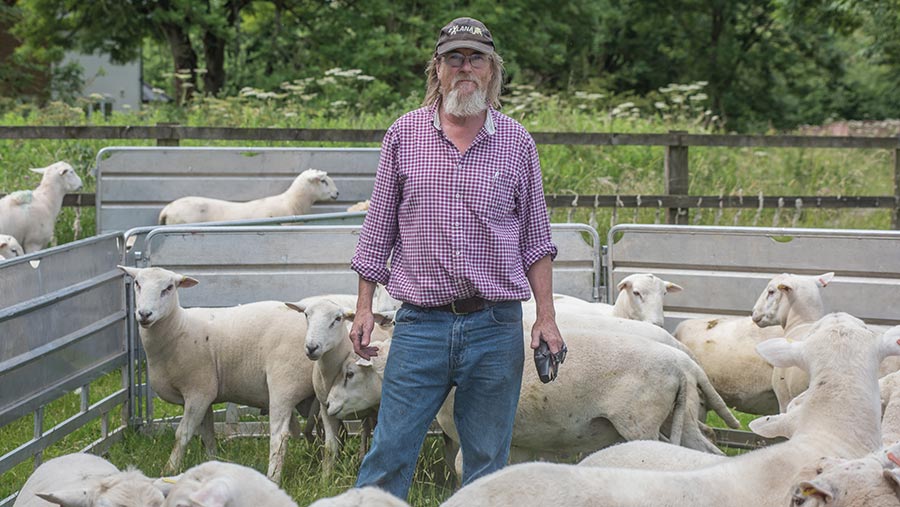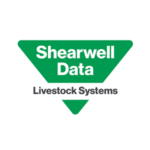Farmers Weekly Awards 2021: Sheep Farmer of the Year
 Tim White, Farmers Weekly 2021 Sheep Farmer of the Year © Hugh Nutt
Tim White, Farmers Weekly 2021 Sheep Farmer of the Year © Hugh Nutt Tim White, Maiden Bradley, Warminster, Wiltshire
Tim White is not a farmer who uses traditional solutions to resolve problems.
When he entered the sheep industry, his quest to find a maternal ewe breed that was “fit for purpose” fell short so, with a small group of other farmers, he devised an improbable solution: to create a completely new breed.
Starting from scratch, Tim and the other Exlana breeders set about designing the ideal breeding ewe.
Farm facts
- Tenant farmer
- Forage-only system
- 800 breeding ewes
- All ram lambs kept entire
- Ewe lambs sold immediately after weaning at a 25kg average
- Cull ewes mostly sold to ABP
- Blood mineral levels monitored in ewes and lambs twice a year
- Member of the Sheep Health and Welfare Group
They sourced the genetics and put a structured breeding programme in place to ensure maximum genetic gain while maintaining high health status.
“I am a sheep breeder as well as a farmer; my job is to breed and select genetics under pressure,’’ says Tim, who adopts a “genetics not cosmetics” approach to breeding.
Breed benefits
In 15 generations, the wool-shedding Exlana now ticks lots of boxes, from parasite resistance and dag reduction to tail length reduction – its popularity is such that it is now exported to New Zealand and Europe.
In his selection for short tails, Tim has reduced the average tail score from a 3.0 (adult tail length below the hock) to a 1.8 (score 2.0 is for tail length at hock level).
He believes docking can be replaced with better selection for low dag scores and low faecal egg counts, along with improved management techniques.
“Future industry lamb welfare practices will be governed by consumer wishes for welfare-friendly and low chemical input husbandry. Low-mutilation rates will be part of these standards,’’ Tim says.
Breeding and selection are done in a commercial situation.
“We have no barns to mollycoddle sheep in, we don’t have access to hay or silage, nor indeed have the machinery to feed it,’’ Tim explains.
This is because he operates his business on short-term land rental agreements with a core of landlords.
Tim has little control over management decisions on this land so he has learned to be “endlessly flexible”, reducing flock size when he loses blocks of land and using it as an opportunity to increase income.
“I am happy to fluctuate. One year I can lamb 600, the next year, 1,000.’’
Technology
His interest in recording and collecting data is paying dividends – by adding value through breeding, he can nearly double flock income.
He has used electronic identification for 16 years, along with a Psion for capturing data “in the field” and the Farmworks program to track performance data.
Technology was also used to maintain sales during the pandemic, with the annual auction of elite rams taking place online.
This reaped rewards as almost 50% of the rams were bought by online bidders and there was a price uplift of 40% on previous years’ sales.
As a farmer, Tim was a late starter – he was 40 when he established his business, but what he has packed into the intervening 18 years many farmers will never achieve in a lifetime.
He worries that farmers work so hard that they don’t allow themselves time to consider opportunities.
“It is all too easy to be too knackered from farming to have the time to think. But it is vital to do that – to think about your aims as a farmer and to consider the opportunities.’’
And his ambition for the future? “To continue to develop the Exlana breed.’’
Winning ways
- Maintaining high welfare while farming stock under pressure
- Running a sustainable business without subsidy
- Encouraging the uptake of share-farming agreements for young entrants
- Creating “win-win” situations through collaboration with landlords, new entrants, breeders and his vet
- Incredible depth of knowledge on selection for worm resistance
A word from our independent judge
“Tim has very refreshing ideas on animal welfare and health and using genetics to help solve some of the common problems in sheep farming.’’
Liz Genever, sheep and beef consultant
Our other finalist was:
- Alwyn Phillips, Pen Y Gelli, Caernarfon, Gwynedd
The Farmers Weekly 2021 Sheep Farmer of the Year Award is sponsored by Shearwell Data
Farmers Weekly’s farming awards celebrates the very best of British agriculture by recognising hard-working and innovative farmers across the UK.
Find out more about the Awards, the categories and sponsorship opportunities on our Awards website.
